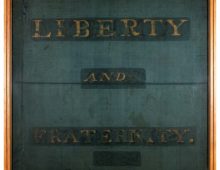Tagged with Manuscripts
Resource : Handwritten declaration of American Independence
In the 1700s Britain controlled and governed extensive areas in the Americas and the Caribbean within its empire. In 1776, thirteen of the colonies in North America came together to reject British rule and the sovereignty of King George III over them, and to declare themselves independent states. This was formalised in the Declaration of Independence, the first step towards establishing a new nation – the United States of America. This handwritten version is thought to be one of the very first to reach Britain.
Resource : Captain Swing letter to Mr Biddle, farmer, High Wycombe
In the 1700s, work was localised and family-orientated, largely agricultural and driven by hand and horse labour. But innovations in steam power and the design of machinery in the late 1700s and early 1800s transformed manufacturing and the way people lived and worked. In the 1820s and 30s, factors such as increasing industrialisation, poor harvests and, specifically, the introduction of the threshing machine meant farming wages were low, working conditions poor and unemployment high. Agricultural workers in the South and East of England protested in what became known as the Swing riots (or agricultural labourers’ risings).
Resource : Holy Willie’s Prayer
Robert Burns also known as Rabbie Burns and as ‘the Bard’ in Scotland, was a Scottish poet and lyricist. He is widely regarded as the greatest Scottish poet and is celebrated each year in Scotland on Burns Night, with traditional suppers including haggis and whiskey, followed by readings of his poetry. His poems used humour and familiar subjects to express big ideas, making them instantly accessible to a wide range of people and are still popular today. Their subject matter, egalitarianism (stressing equality and ordinary people), and underpinning Romanticism left an important imprint that inspired many future reformers.


